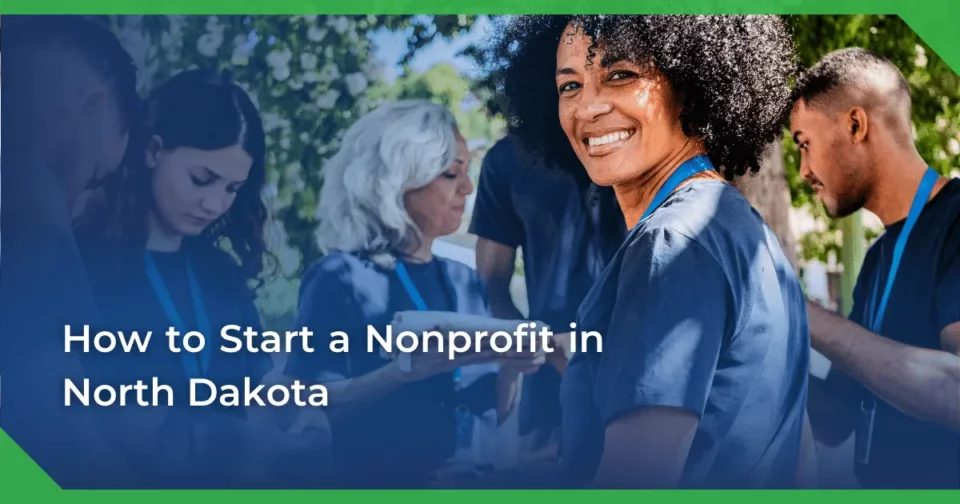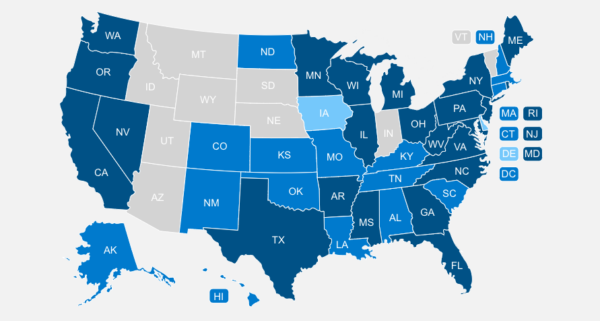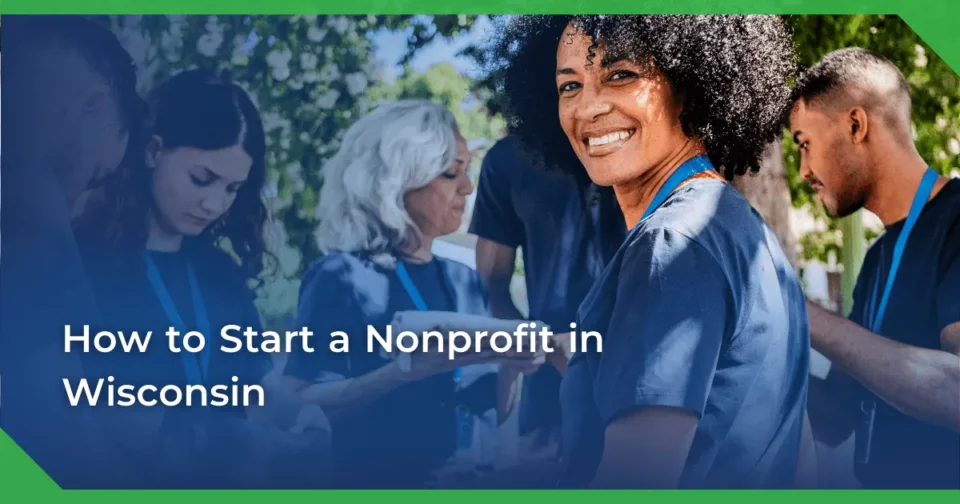
How to Start a Nonprofit in Pennsylvania: Expert Step-by-Step Guide
August 26, 2025
How to Start a Nonprofit in Ohio: A Beginner’s Step-by-Step Guide
August 26, 2025How to Start a Nonprofit in North Dakota: A Step-by-Step Guide for Beginners

Whether you’re passionate about environmental conservation, community development, or social services, starting a nonprofit in North Dakota can transform your vision into meaningful impact. However, the journey from idea to established organization requires careful planning and specific legal steps.
That’s why we’ve partnered with Labyrinth, Inc.’s nonprofit formation services, the sector’s most trusted compliance partner with 100% IRS approval guarantee and Nonprofit Compliance Specialists with over 15 years of experience, to create this comprehensive guide that breaks down every step of starting a nonprofit in North Dakota.
Ready to make a difference in your community? Let’s walk through the essential steps to turn your nonprofit dream into reality!
Check If You’re Ready to Start a Nonprofit
Starting a nonprofit organization requires careful consideration and thorough preparation. Before diving into the legal process, let’s examine the essential aspects you need to evaluate.
Key questions to ask yourself
First, assess if there’s a genuine need for your nonprofit in North Dakota. Consider these critical questions:
- Does your community already have organizations serving the same purpose? If so, supporting an existing nonprofit might be more effective than starting a new one
- Have you developed a clear mission statement and strategic plan?
- Do you have access to qualified individuals who can serve as board members?
Additionally, you’ll need to determine if your organization qualifies for tax-exempt status. Most foundations require nonprofits to maintain active status for at least one year before considering them for funding. Therefore, plan accordingly for sustainable operations during this initial period.
Required time commitment
Running a nonprofit demands significant dedication. Board members typically invest between 4-6 hours per week for engaged positions (committee chairs, officers) and 1-2 hours per week for standard roles, according to the North Dakota Secretary of State’s nonprofit maintenance guidelines. As a nonprofit leader, however, you should prepare for an even greater time investment.
The role of a nonprofit CEO differs substantially from for-profit leadership positions. Nonprofit leaders must:
- Attend multiple formal events monthly as the organization’s public face
- Navigate complex governance requirements
- Manage detailed financial reporting and transparency obligations
- Handle extensive documentation for IRS Form 990 submissions, as detailed in the official North Dakota nonprofit guide
Furthermore, nonprofit executives earn considerably less than their for-profit counterparts. The average nonprofit CEO salary stands at $185,000, compared to $823,000 for for-profit CEOs, as also noted in the North Dakota nonprofit guide. This gap represents substantially more work for significantly less compensation.
Initial funding needs
Starting a nonprofit in North Dakota involves various upfront costs:
- Articles of incorporation filing fee: $40
- IRS 501(c)(3) registration fee: $275 for Form 1023-EZ or $600 for Form 1023
- State incorporation fees: Several hundred dollars additional
- Insurance coverage requirements:
- General liability protection
- Property insurance
- Professional liability coverage
- Management liability protection
- Directors and officers coverage, as per North Dakota state regulations for charitable organizations
Labyrinth offers transparent pricing with no hidden fees and handles all aspects of your nonprofit formation—from state incorporation through federal tax exemption approval. Most foundations prefer organizations with established track records. Consider these alternative funding strategies:
- Secure initial support from board members and community supporters
- Explore fiscal sponsorship opportunities
- Investigate membership fees or program service revenue
- Look into crowdfunding campaigns
- Develop merchandise or product sales initiatives
For professional guidance through this complex process, Labyrinth’s 1-on-1 support from experienced specialists ensures you meet all requirements while avoiding common pitfalls.
Remember, starting a nonprofit requires more than just passion – it demands careful planning, sufficient resources, and unwavering commitment. Take time to evaluate these aspects thoroughly before proceeding with the formal establishment process.
Choose Your Nonprofit’s Focus
North Dakota’s nonprofit sector plays a vital role in strengthening communities and enhancing quality of life across the state. Choosing the right focus for your nonprofit requires thorough research and strategic planning.
Research existing nonprofits
Begin by examining the current nonprofit landscape in North Dakota. The state hosts diverse organizations, including:
- 1,139 religious organizations
- 721 educational institutions
- 671 recreation and sports clubs
- 545 business development organizations
- 434 public sector organizations
Understanding this distribution helps identify underserved areas or opportunities for collaboration. For instance, health organizations, although fewer in number at 277, generate the highest revenue at $3.3 billion annually.
Define your mission
A clear, compelling mission statement serves as your organization’s foundation. As we recommend at Labyrinth’s nonprofit compliance services, your mission statement should:
- Describe your organization’s fundamental purpose
- Specify whom you serve
- Detail how you accomplish your goals
- Reflect your values clearly
- Guide decision-making processes
Your mission statement must align with IRS requirements for tax-exempt status. To qualify for 501(c)(3) status, your Articles of Incorporation must include an IRS-approved purpose clause stating that your organization is organized exclusively for charitable, educational, religious, scientific, or other exempt purposes. Moreover, your mission statement should be concise yet comprehensive, typically ranging between 15-20 words. Rather than using passive phrases like “we will help people,” opt for active language such as “we help people” to demonstrate immediate impact.
Select target community
Identifying your target community involves analyzing demographic data and understanding specific needs. North Dakota’s nonprofit sector currently serves various constituencies:
- Human service organizations reach 13,248 beneficiaries
- Arts and culture nonprofits engage 1,654 community members
- Health organizations serve 27,778 individuals
To define your target audience effectively:
- Review existing data about current and past donors
- Analyze demographic information including age, location, and interests
- Study successful peer organizations
- Conduct market research through surveys or focus groups
- Develop detailed donor personas
For professional guidance on refining your nonprofit’s focus, Labyrinth’s Nonprofit Compliance Specialists can help ensure your organization fills a genuine community need rather than duplicating existing services.
Remember that your chosen focus area must resonate with potential donors and volunteers. Consider that public utilities, hospital systems, and managed care organizations currently generate the highest earnings among North Dakota nonprofits. However, smaller organizations focusing on specific community needs can also create substantial impact through targeted programming and efficient resource allocation.
Complete the Legal Setup Process
The legal setup process marks a crucial milestone in establishing your North Dakota nonprofit. Following state regulations precisely ensures a smooth foundation for your organization’s future operations. With Labyrinth’s fully managed services, you simply provide your organization’s details and review the documents—we handle all the complex filing requirements and correspondence with state and federal agencies.
Pick a unique name
Selecting a distinctive name requires careful consideration of North Dakota’s naming regulations. Your nonprofit’s name must use English language characters that appear in the ASCII table, according to the official North Dakota nonprofit guide. When choosing a name:
- Conduct a preliminary search using the FirstStop Portal’s Business Records Search
- Verify trademark availability through the FirstStop Portal’s Trademark Records Search
- Avoid using terms like “bank,” “banking,” or “trust” without written approval from the North Dakota Department of Financial Institutions
- Consider registering a trade name if planning to use an acronym or abbreviated version
Notably, nonprofit corporations aren’t required to include terms like “company,” “corporation,” or “incorporated” in their names. Conversely, nonprofit LLCs must include “limited liability company,” “LLC,” or “L.L.C.”, as specified in the North Dakota nonprofit guide.
File incorporation papers
The incorporation process in North Dakota involves submitting Articles of Incorporation to the Secretary of State (701-328-4284, sos.nd.gov). The filing fee is $40. Your articles must contain:
- A statement confirming incorporation under N.D.C.C. Chapter 10-33
- The organization’s name
- Principal executive office address
- Commercial registered agent details
- Effective date specification
- Organization’s purpose (including IRS-approved purpose clause for 501(c)(3) qualification)
- Incorporators’ names and addresses, as outlined in the North Dakota nonprofit guide
- Dissolution clause stating that upon dissolution, assets will be distributed for exempt purposes
For 501(c)(3) qualification, your Articles must include specific language approved by the IRS. This includes a purpose clause limiting your activities to charitable, educational, religious, scientific, or other exempt purposes, and a dissolution clause ensuring assets remain dedicated to exempt purposes even if your organization dissolves.
With Labyrinth’s state-specific drop-off service, your documents receive faster processing wherever available in North Dakota. We draft all required documents and ensure compliance with state regulations, including the critical IRS-required clauses.
Get an EIN number
After successful incorporation, obtaining an Employer Identification Number (EIN) becomes essential. This unique nine-digit identifier, issued by the Internal Revenue Service, serves multiple purposes:
- Opening bank accounts
- Establishing credibility in the nonprofit sector
- Applying for tax-exempt status
- Processing payroll if hiring employees
The IRS offers several methods to obtain your EIN:
- Online application (preferred method)
- Fax submission
- Mail-in application
- Phone application (exclusively for international applicants), as detailed in the IRS guide on how to apply for an EIN
Important considerations when applying for an EIN include:
- Wait until your organization is legally formed before applying
- Ensure the application includes the true principal officer’s details
- Complete the process in one session, as the IRS limits EIN issuance to one per responsible party per day
- Prepare for immediate EIN assignment through online applications, as noted by the IRS
Labyrinth includes EIN acquisition as part of our comprehensive nonprofit formation services. As we recommend at Labyrinth, maintaining proper documentation throughout this process helps ensure compliance with state and federal regulations. Subsequently, your organization must file annual reports with the Office of the Secretary of State by February 1st of each year, based on North Dakota Secretary of State’s guidelines. We help you track all deadlines and compliance requirements through our secure SOC 2 Type II nonprofit client portal.
Set Up Your Nonprofit Team
Building an effective nonprofit team stands as a cornerstone of your organization’s success. In North Dakota, specific requirements guide the formation of your leadership structure, ensuring proper governance and operational efficiency.
Required board positions
A North Dakota nonprofit must maintain a minimum of three directors on its board, as specified in the North Dakota nonprofit guide. This aligns with IRS requirements for 501(c)(3) organizations, which also mandate at least three directors. Although organizations with one or two voting members may operate with fewer directors under state law, provided the number matches their voting membership, as noted in the North Dakota nonprofit guide, we recommend maintaining three directors to ensure compliance with federal tax-exemption requirements.
Essential leadership positions encompass:
- President (Chief Executive Officer) – Oversees board meetings and maintains direct communication with the executive director
- Secretary – Manages documentation and ensures legal compliance
- Treasurer – Handles financial oversight and budgeting
- Vice President – Supports presidential duties and often leads specific initiatives, according to the North Dakota nonprofit guide
Each officer must be at least eighteen years old, as stated in the North Dakota nonprofit guide. Board terms usually range from 1-5 years, not exceeding 10 years. To maintain organizational stability, consider implementing staggered term dates for board positions.
The board’s core responsibilities include:
- Authorizing bank account operations
- Approving organizational bylaws
- Overseeing tax-exempt status applications
- Managing emergency situations
- Evaluating the executive director’s performance annually
As we recommend at Labyrinth’s services, whose experienced specialists provide 1-on-1 guidance on governance best practices, establishing clear roles helps prevent confusion and ensures smooth operations. Board members must uphold duties of care, loyalty, and obedience while advancing your organization’s mission.
Finding qualified directors
Identifying suitable board members demands strategic planning and thorough evaluation. Begin by conducting a gap analysis of required skills, experiences, and perspectives. Consider these essential factors:
- Professional expertise aligned with board positions
- Commitment to continuous learning
- Understanding of nonprofit landscapes
- Ability to contribute 4-6 hours weekly for engaged positions or 1-2 hours for standard roles, based on North Dakota Association of Nonprofit Organizations (NDANO) guidelines
For effective recruitment:
- Utilize board-matching programs through local United Ways or community foundations
- Post opportunities on specialized platforms like BoardBuild or BoardLead
- Leverage existing networks including volunteers, stakeholders, and community leaders
- Consider having potential members serve on committees before joining the board
Professional guidance can help streamline your recruitment process and ensure your board structure meets IRS requirements for tax exemption. Remember that financially interested individuals must not constitute more than 49% of your board membership, according to NDANO recommendations.
Upon selecting board members, conduct thorough orientations covering:
- Organizational history and values
- Strategic framework and plans
- Financial data and reporting requirements
- Committee structures and expectations
- Board policies and meeting procedures
Consider implementing a mentoring program where experienced board members guide newcomers through their initial period. This approach accelerates learning curves and strengthens board cohesion.
Ultimately, your board should reflect diversity in skills, perspectives, and community representation. Regular evaluations help ensure continued effectiveness and alignment with your organization’s evolving needs. Through careful selection and proper orientation, you can build a strong foundation for your nonprofit’s governance and future success.
Handle State Requirements
Meeting state requirements marks the final phase of establishing your North Dakota nonprofit. Through careful attention to regulatory details, you’ll ensure your organization operates legally and effectively. Labyrinth’s end-to-end formation support includes handling all state-specific requirements, with first-year fundraising registration included in our bundled services.
Register for fundraising
Before soliciting contributions in North Dakota, nonprofits must register with the Secretary of State through the FirstStop Portal, as outlined on the North Dakota Secretary of State’s charitable organizations page. The initial registration fee stands at $25, alongside a $10 annual report fee. Upon registration, you must submit:
- A financial report detailing operations for the previous 12 months
- A statement confirming unavailable financial information (for new organizations)
- Professional fundraising contracts, if applicable
Annual reports must be filed by September 1st each year, as stated on the North Dakota Secretary of State’s website. Organizations registering in July or August receive an extension until September 1st of the following year. As we recommend at Labyrinth’s comprehensive compliance services, which ensure nonprofits handle all registrations and renewals properly through our secure client portal, maintaining precise documentation ensures ongoing compliance.
Important note: Charitable registration to fundraise is separate from your nonprofit incorporation and federal tax exemption—it’s an additional requirement specifically for organizations that plan to solicit donations in North Dakota.
Apply for tax exemptions
North Dakota offers several tax benefits for qualified nonprofits. First, you must file your Articles of Incorporation with the state, then apply to the IRS for federal tax-exempt status using Form 1023, Form 1023-EZ, or Form 1024 (depending on your organization type). Only after receiving your IRS determination letter confirming 501(c)(3) status does your organization become exempt from state income tax.
Remember: Formation alone does not make donations to your organization tax-deductible. Only after the IRS approves your tax-exempt status can donors claim tax deductions for their contributions.
For sales tax exemptions:
- Complete the Application for Sales Tax Exemption Certificate with the North Dakota Office of State Tax Commissioner (701-328-2770, tax.nd.gov)
- Submit it to the state tax office
- Provide sellers with your Certificate of Exempt Status for tax-free purchases, as per the North Dakota Office of State Tax Commissioner’s guidelines
Certain organizations qualify for property tax exemptions, particularly those:
- Owning and using property for charitable purposes
- Maintaining active 501(c)(3) status
- Submitting annual applications with supporting documentation, as noted in Bismarck’s charitable exemption information
Labyrinth’s specialists prepare all necessary IRS forms—whether 1023, 1023-EZ, or 1024—and respond to any IRS correspondence during the approval process. We guarantee 100% IRS approval for your tax-exempt application.
Get business licenses
Unlike many states, North Dakota doesn’t require a general statewide business license. Still, specific activities might necessitate local permits. Check with your city or county government for any local licensing requirements based on your nonprofit’s activities and location.
Essential ongoing requirements include:
- Filing annual reports by February 1st with a $10 fee, as specified in the North Dakota nonprofit guide
- Maintaining a registered agent within North Dakota
- Submitting amended articles when organizational changes occur ($20 fee), as detailed in the North Dakota nonprofit guide
- Keeping bylaws current ($10 fee per amendment), according to the North Dakota nonprofit guide
- Filing Form 990 annually with the IRS (required for all 501(c)(3) organizations)
Failure to meet these requirements can result in:
- Being placed in “Not Good Standing” status
- Involuntary dissolution after one year of non-compliance
- Revocation of authority for foreign nonprofits, as outlined in North Dakota Secretary of State’s guidelines
For charitable organizations, separate annual reports must be filed – one for nonprofit status and another for charitable registration, as per North Dakota state requirements. Organizations failing to file charitable reports face registration inactivation and must pay additional fees for reinstatement: $10 for annual report filing and $25 for reregistration, based on North Dakota’s charitable organization regulations.
Labyrinth’s reinstatement support services can help nonprofits whose federal tax exemption has been revoked navigate the complex restoration process efficiently.
Conclusion
Starting a nonprofit in North Dakota demands thorough preparation, proper documentation, and strict adherence to state regulations. Most importantly, your success depends on careful evaluation of community needs, sustainable funding strategies, and building a qualified team that meets both state and federal requirements.
Above all, remember that compliance doesn’t end with initial registration. Your organization must maintain accurate records, file timely reports, and stay current with both state requirements and federal obligations including annual Form 990 filings. Additionally, developing strong governance practices through qualified board members—maintaining at least three directors as required by the IRS—helps ensure long-term sustainability.
Therefore, consider partnering with Labyrinth to navigate the complex process of establishing your nonprofit. With our 100% money-back guaranteed 501(c)(3) approval, transparent pricing, and 1-on-1 support from Nonprofit Compliance Specialists, you can proceed with confidence. We handle everything from state incorporation through IRS approval, while you track progress through our secure SOC 2 Type II client portal.
Your dedication to serving North Dakota communities through nonprofit work can create lasting positive change. Start your journey today by following these essential steps, maintaining proper documentation, and building strong organizational foundations.


![Your 501(c)(3) Approval Guaranteed{{ include_custom_fonts({"Museo Sans":["Bold","Bold Italic","Regular","Regular Italic"]}) }}](https://no-cache.hubspot.com/cta/default/560178/interactive-194101957210.png)
![Start Your Nonprofit with Confidence{{ include_custom_fonts({"Museo Sans":["Bold","Bold Italic","Regular","Regular Italic"]}) }}](https://no-cache.hubspot.com/cta/default/560178/interactive-194101957151.png)








